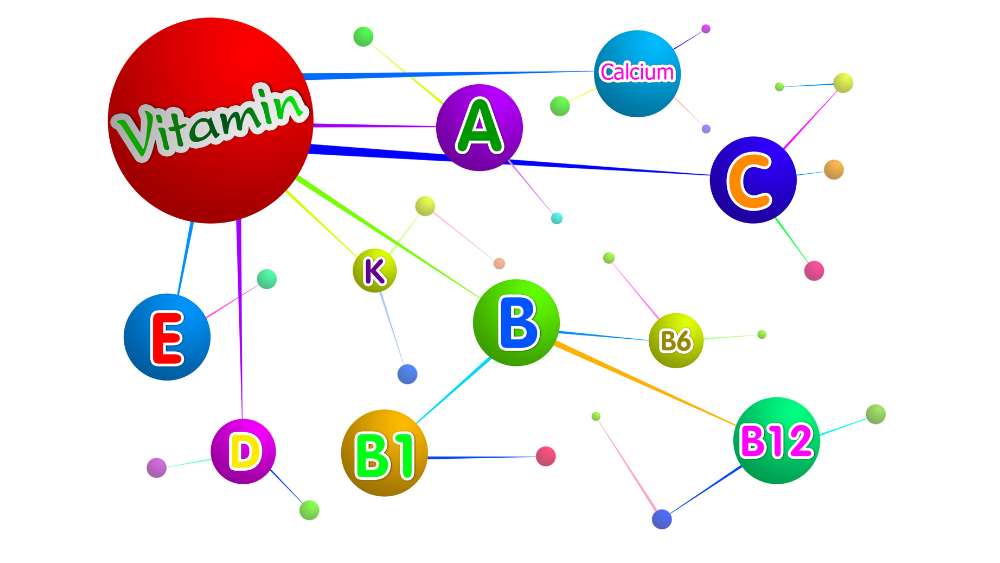What Are Vitamins, and Why Do We Need Them?
Vitamins are tiny but powerful nutrients that play a big role in keeping us healthy. They support everything from energy levels and immunity to bone strength and even wound healing. Because our bodies cannot make enough of these nutrients on their own, we need to get them from food—and sometimes from supplements.
There are 13 essential vitamins. Each one has its own unique job, and even though you only need them in small amounts, they are vital for good health.
Types of Vitamins
Vitamins fall into two groups:
-
Fat-soluble vitamins (A, D, E, K)
-
These dissolve in fat and can be stored in the body for later use.
-
They are best absorbed when eaten with a little healthy fat (like avocado or olive oil).
-
-
Water-soluble vitamins (B-complex and C)
-
These dissolve in water and are not stored in large amounts.
-
Any extra you don’t need is flushed out in your urine, so you need to top them up daily.
-
Fat-Soluble Vitamins
Vitamin A
-
Supports vision, growth, and immunity.
-
Found in: liver, eggs, dairy, sweet potatoes, carrots, and spinach.
-
Deficiency can lead to night blindness and weaker immunity.
Vitamin D
-
Helps your body absorb calcium and keep bones strong.
-
Main source: sunlight. Also in fatty fish, mushrooms, and fortified foods.
-
Low levels can cause weak bones (rickets in children, osteomalacia in adults).
Vitamin E
-
A strong antioxidant that protects your cells.
-
Found in nuts, seeds, spinach, and broccoli.
-
Deficiency is rare but may cause nerve and muscle issues.
Vitamin K
-
Essential for blood clotting and bone health.
-
Found in leafy greens, vegetable oils, eggs, and dairy.
-
Without enough, you may bruise or bleed easily.
Water-Soluble Vitamins
Vitamin C
-
Boosts immunity, helps heal wounds, and supports skin health by making collagen.
-
Found in citrus fruits, berries, peppers, and broccoli.
-
Deficiency can cause fatigue, bleeding gums, and in severe cases, scurvy.
B Vitamins (B1–B12)
Each B vitamin plays a different role, but together they help your body turn food into energy, support brain function, and maintain healthy skin, nerves, and red blood cells.
-
B1 (Thiamine): energy metabolism. Found in whole grains, beans, and meat.
-
B2 (Riboflavin): supports growth and energy. Found in eggs, dairy, and leafy greens.
-
B3 (Niacin): helps with energy and skin health. Found in meat, peanuts, and cereals.
-
B5 (Pantothenic Acid): needed for hormones and metabolism. Found in chicken, mushrooms, and avocado.
-
B6 (Pyridoxine): supports protein use and brain development. Found in fish, bananas, and potatoes.
-
B7 (Biotin): linked to healthy hair, nails, and skin. Found in eggs, nuts, and spinach.
-
B9 (Folate): vital for cell growth and pregnancy. Found in leafy greens, beans, and citrus fruits.
-
B12 (Cobalamin): supports nerves and red blood cells. Found in animal products like meat, fish, and dairy. Vegans often need supplements.
Should You Take Supplements?
Most people can get the vitamins they need from a healthy, balanced diet. However, some groups may benefit from supplements:
-
Pregnant women – prenatal vitamins are important for baby’s development.
-
Older adults – may need more vitamin D, B6, and B12.
-
People with certain medical conditions – such as celiac disease, which affects absorption.
-
Vegans and vegetarians – may need B12 and sometimes vitamin D.
Supplements should not replace healthy food, but they can help fill the gaps when your diet falls short.
Final Thoughts
Vitamins may be small, but they have a massive impact on your health and wellbeing. Eating a colourful, balanced diet full of fresh fruit, vegetables, grains, proteins, and healthy fats is the best way to meet your needs. And if you ever feel unsure, your healthcare provider can guide you on whether a supplement might be right for you.

